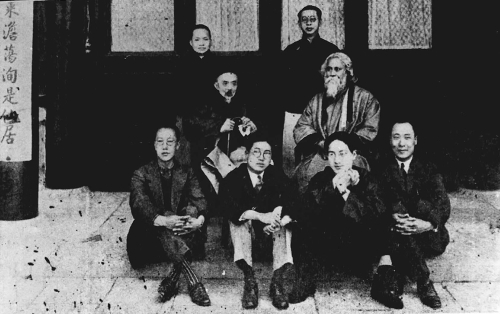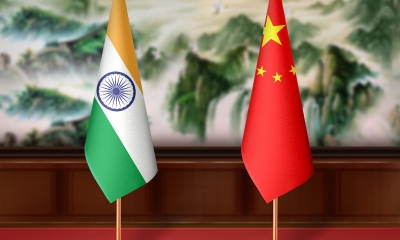Rabindranath Tagore Remains in the Hearts of Chinese People

2024 marks the 100th anniversary of renowned Indian poet Rabindranath Tagore’s visit to China.
“Once I went to the land of China,
Those whom I had not met
Put the mark of friendship on my forehead
Calling me their own”.
Rabindranath Tagore wrote this poem under the title “On My Birthday” on February 21, 1941, a few months before his death. Tagore, the Indian literary giant and first Asian Nobel laureate, is extremely well known by Chinese people for his poems and his friendship with China. He was a great friend of the Chinese people who love reading his literature. He is remembered in China as a great poet and philosopher who made historic contributions to the understanding and communication between China and India.
Tagore’s works have been widely translated into Chinese. As a poet, he inspired the Chinese intellectuals intensely in the early decades of the last century and became an icon of liberty, progress and creation in China.
Tagore’s trip to China, a milestone event in the history of China-India exchanges
Rabindranath Tagore went to China in 1924 during which he visited Shanghai and several other cities and widely interacted with celebrities of the country’s literary and artistic circles of that time. Through his visit to China, he brought together patriots and intellectuals of the two great countries and aroused them from the slumber of ignorance caused by centuries of colonialism and foreign domination. His visit to China in 1924 was described by Chinese scholars as an “earth-shaking event” at that time.
On April 12, 1924, upon setting foot on China’s soil, Tagore made these emotional comments: “I do not know why coming to China seems to me like returning to my native soil. I always feel that India has been one of China’s extremely close relatives, and China and India have been enjoying time-honored and affectionate brotherhood.”
China obviously cast a spell on the Nobel laureate because in his many talks there he waxed eloquent about his admiration for “its world of beauty”, “wisdom” and “touch of the human”. During his visit, Chinese friends celebrated Tagore’s 64th birthday and conferred on him the Chinese name of ‘Zhu Zhendan’, which symbolizes the cultural fusion and long-lasting friendship between the two countries, a name Tagore greatly cherished.
In China, Tagore made several public lectures and profoundly influenced the Chinese cultural and intellectual circles. In his works, you can always see his advocacy of humanity and peace, as well as his critical interpretation of modern Western civilization. Such philosophies had a far-reaching influence on Chinese writers such as Guo Moruo, Xu Zhimo and Bing Xin, and are still of practical significance today.
Being an Indian writer and thinker, Tagore’s compositions reached China in 1915 and no doubt, his writing played a profound role in the development of modern Chinese literature. His great popularity was traced in a survey conducted by China’s Global Times in 2009 which showed Tagore was listed 11th in a list of 60 “most influential foreigners”. During his stay in China, Tagore applauded the traditional friendly relationship and cultural exchanges between India and China. He believed in the mutually beneficial interactive relationship and passionately advocated the reopening of the path between the two countries that had become obscured through the centuries.

Tagore is always remembered in China as a builder of friendship
Rabindranath Tagore is revered throughout China. In modern times, the Chinese leadership gives much importance to the path of Tagore’s humanism and ideals. When paying a visit to India in June 1954, Chinese Premier Zhou Enlai said “We will never forget Tagore’s love towards China and also cannot forget Tagore’s support towards China’s national liberation movement.”
During his visit to India in September 2014, Chinese President Xi Jinping said that he had read several poetry collections of the late Nobel Prize winner in literature and quoted Rabindranath Tagore: “Grow like a summer flower, magnificently; die like an autumn leaf, quietly and beautifully!”
Still today, a century after Tagore’s visit to China on April 12, 1924, Tagore continues to evoke fascination and interest among the Chinese people. On April 12, 2024, a seminar was held at Shenzhen University to mark the centenary of Rabindranath’s visit to China. China’s two top universities, Peking University and Tsinghua University held a series of activities to celebrate 100 years of Rabindranath Tagore’s visit to China.
On the other hand, attending a two-day international conference to commemorate the centenary of Rabindranath Tagore’s visit to China in Santiniketan on April 2-3, Ms. Ma Jia, Charge d’Affaires of the Chinese Embassy in India, said Tagore’s visit to China is of great significance and will play a major role in promoting exchanges and mutual learning between the two major civilizations of China and India. She said, “China will not forget how Rabindranath Tagore supported the Chinese people’s liberation cause with the power of his pen”.
Rabindranath Tagore was a close friend of the Chinese people. He went to China with a message of love and brotherhood that he felt symbolized the essence of the ties between India and China. A century ago, China and India were in the violent struggle against foreign invasion and colonialism. In July 1937, the Japanese imperialists launched an all-out war of aggression against China. Observing the darkening despair and destruction of war he was greatly shuddered at Japan’s ruthless aggression in China. He stood on the side of China and condemned Japanese imperialism through his poems and writings; he was quite hopeful of China’s victory against Japanese imperialism. He said, “China is unconquerable, her civilization has endless potential, and her people, with their unconditional loyalty to the country and unprecedented unity, are creating a new century for that country.”
Through his visit to China in 1924, Tagore sowed the seeds of a new understanding and friendship between China and India in the modern age. Through the establishment of Cheena Bhavana, Department of Chinese Language and Culture at Visva-Bharati University, Santineketan in India’s West Bengal state, he laid the foundations for a new dialogue and intellectual exchange between the two ancient civilizations. He always emphasized that the people of India and China should cooperate closely, which is beneficial for both countries.
No one can dispute that the life of this great Indian poet and his writings will inspire the people of the two nations, particularly the youth, to dedicate themselves to the cause of India-China friendship, and in the process, will enable the two countries to achieve the mutual contact of hearts and minds that Tagore dreamed about.
The article reflects the author’s opinions, and not necessarily the views of China Focus.
 Facebook
Facebook
 Twitter
Twitter
 Linkedin
Linkedin
 Google +
Google +







